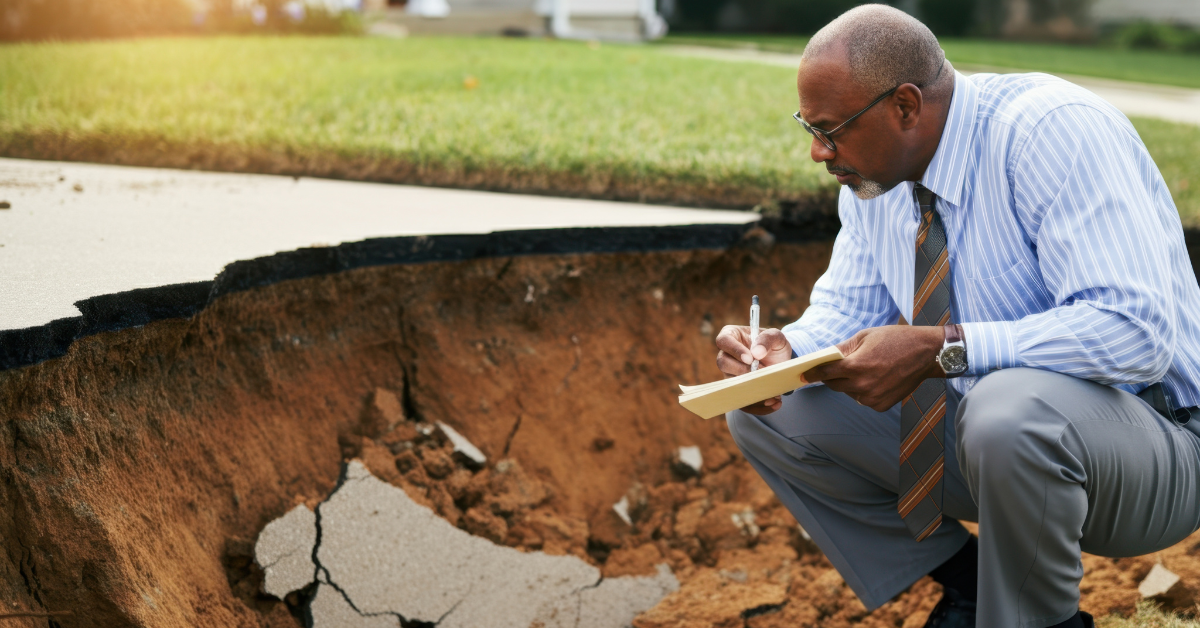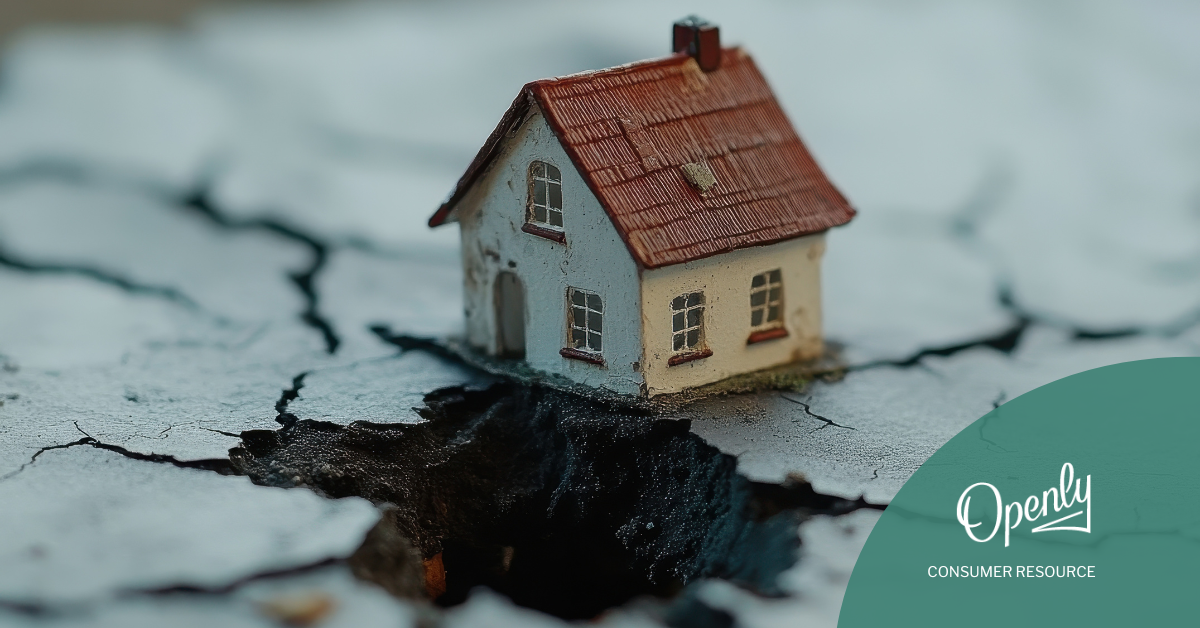Sinkholes can be a terrifying prospect for homeowners, especially those living in regions prone to these sudden and destructive events. While a typical homeowners insurance policy may provide some level of coverage, it's important to understand the limitations and consider additional protection.
This article will clarify what is and isn't covered under most homeowners insurance policies regarding sinkholes, and explore how you can secure the right protection for your home.
At a glance:
- Standard homeowners insurance policies typically do not cover damage caused by sinkholes, as they are considered "earth movement" events.
- A separate "sinkhole endorsement" or "earth movement coverage" can often be added to a homeowners policy for an additional premium to protect against sinkhole damage.
- Homeowners in sinkhole-prone areas should assess their risk, consider the value of their property, and weigh the cost of a sinkhole endorsement against the potential financial impact.
What is a sinkhole and why is it a concern for homeowners?
A sinkhole is a depression or hole in the ground that forms when the underlying soil or rock erodes away. This happens naturally when moving water dissolves small amounts of rock and carries it away, causing pores or cracks to form in the bedrock. Over time, as more rock disintegrates, larger cavities and even caves can form, at which point the surface can collapse into the created voids, causing a sinkhole.1
There are other causes for sinkholes, including droughts followed by sudden rains, and human activities like groundwater pumping and drilling can cause sinkholes to develop.
Sinkholes pose a significant threat to homeowners, particularly in areas like Florida, Kentucky, and Tennessee, where geological conditions make them more likely to occur. Sinkholes can cause severe damage to the following, among others:
- Foundations—Leading to structural instability and potential collapse of the entire home.
- Landscaping—Destroying trees, shrubs, and other outdoor features.
- Pools and driveways—Causing cracks, subsidence, and even total collapse.
- Utilities—Disrupting water, sewer, and gas lines.
The impact of a sinkhole on a homeowner can be devastating, not only in terms of property damage but also in terms of reduced home value—not to mention the emotional stress of dealing with the aftermath.
Does homeowners insurance cover sinkholes?
No, standard homeowners insurance policies typically do not cover damage caused by sinkholes.
Why? Sinkholes are generally considered "earth movement" events, which are often excluded from standard policies. Not only are earth movements hard to predict, they are also difficult to investigate.
Sinkhole damage can be expensive to repair, therefore it is recommended that homeowners carefully review your current homeowners insurance policy to understand your existing coverage and any exclusions.
Don’t be afraid to contact your insurance agent to discuss your concerns about sinkhole risk. They can help you determine if a sinkhole endorsement is right for you and may even be able to provide you with a quote for the additional coverage options to cover your sinkhole risk.
Clarifying coverage
As previously mentioned, homeowners insurance typically does not cover damage caused by sinkholes because sinkholes are generally considered a "catastrophic" event, similar to earthquakes, which are often excluded from standard policies.
That doesn’t mean homeowners are left without options. Some insurance policies may offer limited coverage through a separate sinkhole or earth movement endorsement. These endorsements are optional and typically require an additional premium. Therefore it is recommended that you carefully review your homeowners insurance policy—and your finances—to determine what you need in insurance coverage, especially if you can purchase sinkhole coverage as an add-on, and how much you can afford. 
What homeowners need to know about sinkhole endorsements
If you live in a region prone to sinkholes, understanding sinkhole endorsements is critical to the safety of your home and loved ones. Specialized endorsements (also known as riders) can provide vital financial protection for your home and belongings in the event of a sinkhole collapse.
What is sinkhole insurance?
A sinkhole endorsement is a specialized endorsement that can be added to your standard homeowners insurance policy to provide coverage for damage caused by sinkholes. This coverage typically includes3:
- Structural components—Coverage for damage to walls, floors, ceilings, and other structural elements of your home.
- Personal property loss—Reimbursement for damaged or destroyed belongings due to the sinkhole.
It is important to note that although sinkhole insurance does provide some level of financial protection, it may not cover foundation repairs.
Is sinkhole coverage necessary?
Whether or not to purchase sinkhole coverage depends on several factors, including:
- Your location—If you live in a region known for sinkhole activity (e.g., Florida, Kentucky, Tennessee), the risk is higher.
- The value of your property—If you own a high-value home, the potential financial impact of a sinkhole could be significant.
- Your budget—Sinkhole coverage typically increases your insurance premiums, so you need to weigh the cost against the potential benefits.
How to add sinkhole coverage to your policy
To add sinkhole coverage to your existing homeowners insurance policy, follow these steps:
- Contact your insurance provider—Reach out to your home insurance provider or a local insurance agent near you and ask about adding a sinkhole endorsement to your policy.
- Discuss your coverage options—Review the available coverage options and choose the level of protection that best suits your needs and budget.
- Obtain a quote—Get a quote for the additional premium for sinkhole coverage.
- Make any necessary changes to your policy—Once you've decided to add coverage, your insurance provider will update your policy accordingly.
Signs you might be at risk for a sinkhole
Certain regions are more susceptible to sinkhole formation than others. Factors that contribute to sinkhole risk include:
- Soil types—Areas with underlying layers of limestone, gypsum, or salt are more prone to sinkholes.4
- Underground water flow—Changes in groundwater levels can increase the risk of sinkhole formation.
- Historical occurrences—If sinkholes have occurred in your area previously, the risk of future events is higher.
Signs of potential sinkhole activity
If you notice any of the following signs, it may indicate a potential risk of sinkhole formation:
- Cracks in walls, floors, or ceilings—These cracks can appear suddenly or gradually worsen over time.
- Sudden shifts in landscaping—Noticeable depressions or sinking in your yard could be an early warning sign of a developing sinkhole.
- Trees or shrubs leaning or tilting—This can indicate that the ground beneath them is unstable.
If you observe any of these signs, it's crucial to inspect your property thoroughly and contact your insurance agent or insurance provider for advice on how to proceed.
Preventing and preparing for sinkhole damage
While you can't entirely prevent sinkholes from forming, there are steps you can take to mitigate the risk and prepare for a potential event:
- Regular property inspections—Conduct regular inspections of your home and property, looking for any signs of foundation issues or ground movement.
- Monitor for signs of foundation issues—Pay attention to any cracks in your foundation, walls, or floors.
- Maintain proper drainage—Ensure that water drains away from your home properly to prevent excessive moisture buildup in the soil.
- Avoid excessive irrigation—Overwatering your lawn can contribute to soil erosion and may increase the risk of sinkhole formation.
How to prepare for a sinkhole
Although sinkholes are difficult, if not impossible to predict, there are steps you can take to ensure you and your loved ones are prepared for an unexpected event:
- Create an evacuation plan—Determine safe escape routes from your home in case of an emergency.
- Create a home inventory—Document your personal belongings with photos and descriptions to assist with insurance claims.
- Protect your financial assets—Ensure you have adequate homeowners insurance coverage, including a sinkhole endorsement if necessary, to protect your financial investment.
Consulting with your home insurance provider or insurance agent is an essential step in preparing for sinkhole risks. They can help you assess your current coverage, discuss potential risks, and explore options for enhancing your protection.
What to do if a sinkhole damages your home
If you suspect that a sinkhole has damaged your property:
- Contact emergency services—Call your local emergency services immediately if the sinkhole poses a danger to you or others.
- Document the damage—Take photos and videos of the damage to your property, including the sinkhole itself, any structural damage, and any damaged personal belongings.
- File a claim with your insurer—If you’ve added an endorsement to cover damage or loss due to sinkholes, contact your insurance provider as soon as possible to report the damage and begin the claims process.
Protecting your home from sinkhole risks
Understanding the intricacies of homeowners insurance coverage regarding sinkholes is critical for the protection of your home and loved ones, and for your financial well-being. While standard policies typically have limitations and exclusions for sinkhole coverage, adding a sinkhole endorsement can provide valuable protection in high-risk areas.
By carefully reviewing your policy, understanding the potential risks, and taking proactive steps to prepare, you can significantly reduce the impact of a sinkhole event on your life. To ensure you have the right coverage, find a local independent agent near you or request a home insurance quote online today.
* We provide this information to help you understand insurance. Any coverage is subject to the terms of your policy. Please refer to your policy and declarations page for complete terms, conditions and coverage details.
1 Insurance Information Institute. “Sinkholes and Insurance.” III.org. Accessed 6 Feb 2025. https://www.iii.org/article/sinkholes-and-insurance
2 American Geosciences Institute. “Sinkholes.” Accessed 6 February 2025. https://profession.americangeosciences.org/society/inte
rsections/sinkholes/#:~:text=Sinkholes%20have%20both%20natural%20and,Pennsylvania%20are%20most%20sinkhole%2Dprone.
3 Shannon Martin. “What is sinkhole insurance?” Bankrate. Published 1 February 2025. Accessed 6 February 2025. https://www.bankrate.com/insurance/homeowners-insurance/sinkhole-insurance/
4 “Sinkholes and Insurance.” III.org




